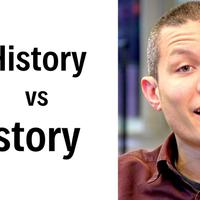History vs Story - English In A Minute - YouTube
История vs Рассказ||История|||||
Tarih|||||||
|contra||||||
تاریخ|در برابر||||||
Geschichte vs. Geschichte – Englisch in einer Minute – YouTube
History vs Story - English In A Minute - YouTube
History vs Story - English In A Minute - YouTube
Histoire vs Histoire - English In A Minute - YouTube
Storia contro storia - Inglese in un minuto - YouTube
歴史vsストーリー-1分で英語-YouTube
Historia vs historia - Angielski w minutę - YouTube
História vs. Estória - Inglês Num Minuto - YouTube
История vs рассказ - Английский за минуту - YouTube
Tarih ve Hikaye - English In A Minute - YouTube
Історія vs розповідь - англійська за хвилину - YouTube
Lịch sử vs Câu chuyện - Tiếng Anh Trong Một Phút - YouTube
历史与故事 - 一分钟英语 - YouTube
歷史與故事 - 一分鍾英語 - YouTube
Dan: Hi, I'm Dan from BBC Learning English
|||Дэн||||
Dan|||||||
Дан|||||||
|||دن||||
Dan: Hallo, ich bin Dan von BBC Learning English
ダン:こんにちは、BBCラーニングイングリッシュのダンです
Dan: Chào, tôi là Dan từ BBC Learning English
and today I'm going to tell you the difference
||||||||تفاوت
und heute werde ich Ihnen den Unterschied sagen
今日は違いをお話しします
và hôm nay tôi sẽ nói với bạn về sự khác biệt
between those two confusing words
|||запутанных|словами
|||gây nhầm lẫn|
|||verwirrenden|
|||karıştırıcı|
|||گیج کننده|
|||المربكة|
mezi těmito dvěma matoucími slovy
zwischen diesen beiden verwirrenden Wörtern
entre esas dos palabras confusas
それらの2つの紛らわしい言葉の間
giữa hai từ gây nhầm lẫn đó
history and story.
Geschichte und Geschichte.
historia y relato.
歴史と物語。
lịch sử và câu chuyện.
Both words are used for a description
||||||توصیف
||||||Beschreibung
||||||وصف
||||||tanım
Obě slova se používají pro popis
Beide Wörter werden für eine Beschreibung verwendet
説明には両方の単語が使用されます
Cả hai từ đều được sử dụng để mô tả
of events. So that makes them the same, right?
|события|||||||
|رویدادها|||||||
událostí. Takže to je dělá stejné, ne?
von Veranstaltungen. Das macht sie also gleich, oder?
イベントの。それで彼らは同じになりますよね?
이벤트의 수입니다. 그래서 같은 것이겠죠?
các sự kiện. Vậy nên chúng giống nhau, đúng không?
WRONG! They are not the same.
неправильно|||||
FALSCH! Sie sind nicht gleich.
間違い!それらは同じではありません。
SAI! Chúng không giống nhau.
History is the description or study of past
|||||||گذشته
Geschichte ist die Beschreibung oder das Studium der Vergangenheit
歴史は過去の記述または研究です
Lịch sử là sự mô tả hoặc nghiên cứu về quá khứ
events based on fact, often to understand
события||||||
events||||||
|dayanan||gerçekler|||
|مبتنی||واقعیت|||
události založené na skutečnosti, často k pochopení
Ereignisse auf der Grundlage von Tatsachen, oft zu verstehen
acontecimientos basados en hechos, a menudo para comprender
événements basés sur des faits, souvent pour comprendre
事実に基づくイベント、しばしば理解する
sự kiện dựa trên thực tế, thường để hiểu
their consequences. 'Christopher
|их последствия. Кристофер|
||Christopher
|hậu quả|Christopher
|sonuçları|
|عواقب|کریستوفر
|عواقبهم|
|наслідки|
jejich důsledky. "Christophere."
ihre Folgen. „Christoph
それらの結果。 'クリストファー
그 결과입니다. 'Christopher
hệ quả của chúng. 'Christopher
Columbus arrived in America in 1492.'
|прибыл|||
Columbus||||
Columbus||||
|kam|||
کلمب|رسید|||
コロンブス||||
Kolumbus kam 1492 in Amerika an.'
コロンバスは1492年にアメリカに到着しました。
Columbus đã đến nước Mỹ vào năm 1492.'
A story is the description of a series of
Eine Geschichte ist die Beschreibung einer Reihe von
物語は一連の物語です
Một câu chuyện là mô tả về một loạt các
real or imagined events, often to entertain
реальные||воображаемые|события|||развлекать
||||||unterhalten
||hayal edilen||||eğlendirmek
واقعی||||||
||المتخيلة||||
||||||розважати
||||||楽しませる
skutečné nebo domnělé události, často k pobavení
reale oder eingebildete Ereignisse, oft zur Unterhaltung
多くの場合、楽しませる実際のまたは想像上のイベント
sự kiện thật hoặc tưởng tượng, thường để giải trí
people. 'After arriving in America in 1492,
||رسیدن|||
||الوصول إلى|||
Personen. „Nachdem er 1492 in Amerika ankam,
人。 '1492年にアメリカに到着した後、
cho mọi người. 'Sau khi đến Mỹ vào năm 1492,
Columbus and his crew were attacked by a giant
|||экипаж||атакованы|||гигант
|||tripulação|||||
|||thuyền viên|||||khổng lồ
||||||||غول
||||||||عملاق
|||екіпаж||атаковані|||велетенський
Kolumbus a jeho posádka byli napadeni obrem
Kolumbus und seine Crew wurden von einem Riesen angegriffen
Colombo e il suo equipaggio furono attaccati da un gigante
コロンバスと彼の乗組員は巨人に襲われた
man-eating T-Rex dinosaur!' That didn't
|пожирающий||Рекс|динозавр|Это|
|||Rex|dinosaur||
|||T-Rex|Dinosaurier||
||||dinosauro||
|خوار|||دایناسور||
||||динозавр||
|||レックス|||
lidožravý dinosaurus T-Rex!“ To ne
menschenfressender T-Rex-Dinosaurier!' Das nicht
人食いT-Rex恐竜!」それはしませんでした
happen! It's just a story.
произойти||просто||
میشود||||
stát se! Je to jen příběh.
passieren! Es ist nur eine Geschichte.
起こる!それはただの話です。
So… history is the description of past
||||опис||
Takže... historie je popis minulosti
Also… Geschichte ist die Beschreibung der Vergangenheit
だから…歴史は過去の描写です
Vì vậy... lịch sử là sự miêu tả về quá khứ
events based on fact and stories are descriptions
|||||||описания событий
|||hecho||||
|на основі||||||
|||||||توصیفها
Ereignisse, die auf Fakten und Geschichten basieren, sind Beschreibungen
事実と物語に基づくイベントは説明です
eventos baseados em factos e histórias são descrições
các sự kiện dựa trên sự thật và những câu chuyện là sự miêu tả
of unreal or imagined events often to entertain.
|нереальный||воображаемых|события|часто||развлекать
|irreal||||frequentemente||
|hư cấu||||||
|غیرواقعی||||||
|غير واقعي||||||
|нереальних||уявних|події|||розважити
|非現実的な||||||
von unwirklichen oder eingebildeten Ereignissen oft zur Unterhaltung.
多くの場合、実際のまたは想像上のイベントを楽しませます。
của các sự kiện không có thật hoặc tưởng tượng thường để giải trí.
Leave us a comment about a piece
|||комментарий|||произведение
|||nhận xét|||
||||||parça
||||||قطعه
||||||قطعة فنية
залиште нам|||коментар|||статті
Zanechte nám komentář ke kousku
Hinterlasse uns einen Kommentar zu einem Stück
作品についてコメントを残してください
of history or an imagined story from your culture!
из||||представленный||||культура
||||||||فرهنگ
Geschichte oder eine erfundene Geschichte aus Ihrer Kultur!
あなたの文化からの歴史や想像上の物語の!
역사나 문화에서 상상한 이야기를 들려주세요!
của lịch sử hoặc một câu chuyện tưởng tượng từ văn hóa của bạn!
We'll try and guess which is which!
||||quale||
Zkusíme hádat, která je která!
Wir versuchen zu erraten, welches was ist!
Nous allons essayer de deviner qui est qui !
Cercheremo di indovinare quale sia!
どれがどれかを推測してみます!
어느 쪽이 맞는지 맞춰보겠습니다!
Chúng ta sẽ cố gắng đoán cái nào là cái nào!

